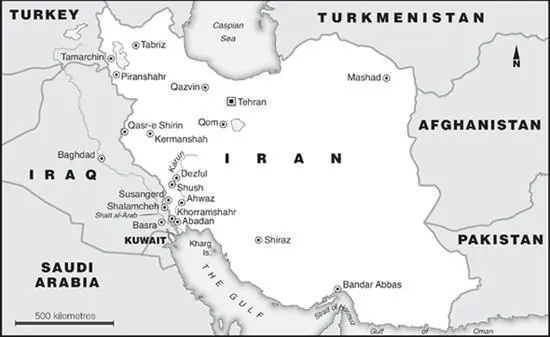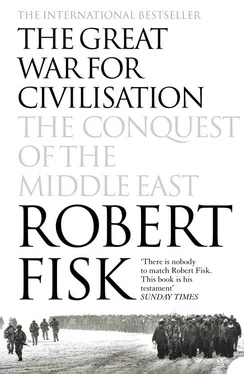Had plucked up mercy by the roots were glad
Of this new enemy. Tyrants, strong before
In devilish pleas, were ten times stronger now,
And thus beset with foes on every side,
The goaded Land waxed mad; the crimes of few
Spread into madness of the many, blasts
From hell came sanctified like airs from heaven;
WILLIAM WORDSWORTH, The Prelude , 1805,
Book Tenth
Christopher Montague Woodhouse was asking himself if he had helped to create the Islamic revolution in Iran. He was an old man now, but you could see the energy that still gripped him, a tall, dignified, brave and ruthless 79-year-old. It was snowing that morning in Oxford in 1997, but he had come to the gate of his retirement home to greet me, his handshake a vice. He sat ramrod-straight in his library with the mind of a young man, answering my questions with the exactness of a Greek scholar, each sentence carefully crafted. He had been Britain’s senior secret agent in ‘Operation Boot’ in 1953, the overthrow of Iran’s only democratic prime minister, Mohamed Mossadeq. It was ‘Monty’ Woodhouse who helped to bring the Shah of Iran back from exile, along with his colleagues in the CIA, who set in motion a quarter-century in which the Shah of Shahs, ‘Light of the Aryans’, would obediently rule Iran – repressively, savagely, corruptly and in imperious isolation – on our behalf. Woodhouse was a reminder that The Plot – the international conspiracy, moamara in Arabic – was not always the product of Middle East imagination. Woodhouse was in the last years of a life in which he had been a guerrilla fighter in Greece, a Tory MP and a much honoured Greek linguist and academic. Almost everyone who had destroyed Iranian democracy was now dead; Kermit Roosevelt, the senior CIA man in Tehran, his boss Allen Dulles, Robin Zaehner of the British Foreign Office, the two mysterious Rashidian brothers who organised the coup, Mossadeq himself and the last Shah of Iran. ‘Monty’ was the last survivor.

We had known each other for nine years, ever since The Times sent me to investigate the secret wartime history of former UN secretary-general and ex-Wehrmacht Oberleutnant Kurt Waldheim in Bosnia. *Woodhouse, along with the brilliant British scholar Gerald Fleming, had relentlessly pursued the former Austrian intelligence officer in the German army for personal as well as moral reasons; Waldheim’s initial ‘W’ appeared below the interrogation summary of one of Woodhouse’s Special Operations Executive officers who was captured in Yugoslavia and later executed by the Gestapo. Woodhouse was a man who lived first in the shadows – in the wartime Balkans and Tehran – and then as a member of parliament, and I wanted to know, before he died, why Britain and the United States, the ‘West’ – why we – had chosen to destroy Iran’s only secular democracy.
Woodhouse looked at me with his penetrating, unwavering eyes. ‘I’ve sometimes been told that I was responsible for opening the doors for the Ayatollah – for Khomeini and the others,’ he said. ‘But it’s quite remarkable that a quarter of a century elapsed between Operation Boot and the fall of the Shah. In the end it was Khomeini who came out on top – but not until years later. I suppose that some better use could have been made of the time that elapsed.’ I was astonished. The coup against Mossadeq, the return of the Shah, was, in Woodhouse’s mind, a holding operation, a postponement of history. There was also the little matter of the AIOC, the Anglo-Iranian Oil Company – later British Petroleum – which Mossadeq had just nationalised. You could tell from the way he spoke, the urgent movement of his hands, that this had been one of the most exciting moments of Woodhouse’s life. The return of the young Mohamed Reza Shah Pahlavi was the ultimate goal. It cost a couple of million pounds, a planeload of weapons and perhaps five thousand lives. And twenty-five years later, it all turned to dust.
The Americans called their plot ‘Operation Ajax’, which must at least have appealed to the scholar in Woodhouse, even if its classical origins did not invoke success; Ajax was second only to Achilles in bravery, but he killed himself in a fit of madness, a fate the Americans would like to have visited upon Mossadeq. It was, in any case, a long way from later and more ambitious campaigns of ‘regime change’ in the Middle East, and a few neo-conservatives in the Pentagon in 2003 might have dusted off the archives of the early Fifties to see how to topple Middle East leaders before embarking on ‘Operation Iraqi Freedom’. But then Operation Boot/Ajax – though it was undeniably about oil – was never intended to change the map of the Middle East, let alone bring ‘democracy’ to Iran. ‘Democracy’, in the shape of the popular and somewhat effete Mossadeq, was the one thing Washington and London were not interested in cultivating. This was to be regime change on the cheap.
The project had not attracted President Truman, but when Eisenhower arrived at the White House in 1953, America was already fearful that Mossadeq would hand his country over to the Soviets. The CIA end of the operation was run by the splendidly named Kermit Roosevelt – grandson of the buccaneering ex-president Theodore – and his victim was the very opposite of Saddam Hussein. ‘No nation goes anywhere under the shadow of dictatorship,’ Mossadeq once said – words that might have come from President George W. Bush’s speechwriters half a century later. But one thing Mossadeq did have in common with the later dictator of Iraq; he was the victim of a long campaign of personal abuse by his international opponents. They talked about his ‘yellow’ face, of how his nose was always running; the French writer Gérard de Villiers described Mossadeq as ‘a pint-sized trouble-maker’ with the ‘agility of a goat’. On his death, the New York Times would claim that he ‘held cabinet meetings while propped up in bed by three pillows and nourished by transfusions of American blood plasma’. True, Mossadeq, an aristocrat with a European education, had a habit of dressing in pink pyjamas and of bursting into tears in parliament. But he appears to have been a genuine democrat – he had been a renowned diplomat and parliamentarian – whose condemnation of the Shah’s tyranny and refusal to sanction further oil concessions gave his National Front coalition mass popular support. When Woodhouse arrived in Tehran – officially, he was the British embassy’s ‘information officer’ – Iran was already on the brink of catastrophe. Negotiations had broken down with the AIOC, whose officials, Woodhouse admitted, were ‘boring, pig-headed and tiresome’. The British ambassador was, according to Woodhouse, ‘a dispirited bachelor dominated by his widowed sister’ and his opposite number an American business tycoon who was being rewarded for his donations to the Democratic Party. *
‘One of the first things I had to do was fly a planeload of guns into Iran,’ Woodhouse said. He travelled on the aircraft from the Iraqi airbase at Habbaniya – decades later, it would be one of Saddam Hussein’s fighter-bomber stations, and later still a barracks for America’s occupation army – and then bought millions of Iranian riyals, handing them over at a secret location to the Rashidian brothers. They were to be the organisers of the mobs who would stage the coup. The guns would be theirs, too – unless the Soviet Union invaded Iran, in which case they were to be used to fight the Russians.
‘We landed in Tehran after losing our way over the Zaghros mountains. They were mostly rifles and sten guns. We drove north in a truck, avoiding checkpoints by using by-roads. Getting stopped was the sort of thing one never thinks about. We buried the weapons – I think my underlings dug the holes. And for all I know those weapons are still hidden somewhere in northern Iran. It was all predicated on the assumption that war would break out with the Soviet Union. But let me clarify. When I was sent to Tehran, it was not for the purpose of political interference. In fact, political interference at the British embassy in Tehran was in the hands of a quite different personality, Robin Zaehner. He was very good company, very intelligent but very odd. His function was to get rid of Mossadeq. This only became my function when Zaehner despaired of it and left Tehran.’
Читать дальше













